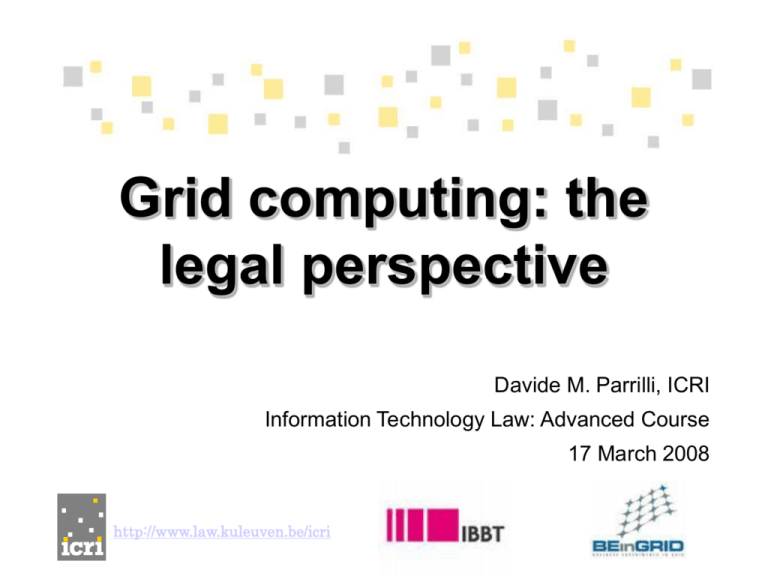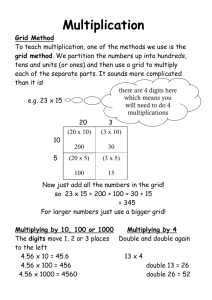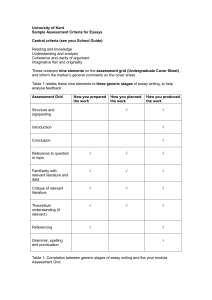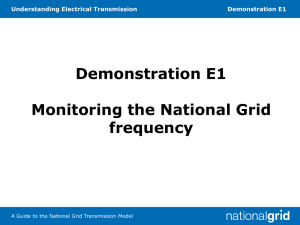97Lecture Grid computing 170308
advertisement

Grid computing: the legal perspective Davide M. Parrilli, ICRI Information Technology Law: Advanced Course 17 March 2008 http://www.law.kuleuven.be/icri Agenda • What does Grid computing mean? • What is Grid computing from the technical and business point of view? • To what extent Grid computing will affect lawyer’s activity in Europe? Selected issues. Question… Did you ever heard about Grid computing? Grid: a definition (I) Grid in general terms: “a grid is something which is in a pattern of straight lines that cross over each other, forming squares”. (source: Collins, English Dictionary for Advanced Learners) Grid: a definition (II) Graphically…. Grid: a definition (III) The same idea lays behind the notion of Grid computing: the key concept to keep in mind is that Grid, although in different forms, covers the spectrum of distributed computing: in other words resources located in different places that work together. Grid: a definition (IV) Graphically… Grid: a definition (V) On a global scale…. Grid: a definition – infrastructure (I) Three specific definitions of Grid computing from different perspectives: 1. Technical-oriented definition: multiple independent computing clusters which are composed of resource nodes not located within a single administrative domain; Grid: a definition – infrastructure (II) • Many national Grid infrastructures; • Examples of international networks: 1. BalticGrid: Baltic countries, Poland, Sweden, Switzerland; 2. Nordic Data Grid Facility: Denmark, Finland, Norway, Sweden; 3. NorduGrid: as above; 4. LCG Grid: worldwide; 5. Network.com (Sun Microsystems): worldwide Grid: a definition – computing on demand (I) 2. Business-oriented definition: in distributed computing, the offer of online computation or storage as a metered commercial service, or the provision of SaaS: utility computing, computing on demand, or cloud computing; Grid: a definition – computing on demand (II) Graphically… End User He needs computation or storage power or the provision of software but he does not have the necessary resources Supplier of capability or SaaS Grid: a definition – computing on demand (III) Examples: • 3tera-AppLogic: provision of SaaS; • Elasticlive: web hosting capacity; • Oracle: storage and resource capacity; • IBM: storage capacity; • [Others: see www.gridipedia.eu] Grid: a definition – virtual supercomputer (I) 3. Academic-oriented definition: creation of a "virtual supercomputer" by using spare computing resources within an organization or a network of geographically dispersed computers. Grid: a definition – virtual supercomputer (II) Graphically… Grid: a definition – virtual supercomputer (III) An example from the academic domain in the NL: Grid: a definition – virtual supercomputer (IV) Examples: • DAS-3 Grid: NL; • LCG: CERN and other institutions worldwide; • Oxford University’s Centre for Computational Drug: worldwide, dispersed network; • iGrid: India; • University of Florida Grid. Grid and business (I) From the business point of view the definition no. 2 is the most relevant: •Provision of resources, capacity, etc. to end users through a Grid network; •Provision of applications to end users through a Grid network. Grid and business (II) GRID has shifted from being seen just as a way to save costs towards as a means to make money… In 2011 Grid market will reach 9.02 billions Euros Legal aspects of Grid (I) Should an ICT lawyer be concerned wit Grid technology? Does Grid have any impact from the legal point of view? Legal aspects of Grid (II) In other words… Is Grid a neutral technology? Legal aspects of Grid (III) Grid does matter… we’ll take into account some specific fields: 1) Business contracts; 2) Patents; 3)Taxation. Business contracts (I) Impact of Grid on ASP: contract regarding the provision of computer-based services (software) to customers over a network (Internet); the provider can be either the owner of the software or a licensee (sub-license). Business contracts (II) Definition of the operating environment: provision regarding the technical modalities of the delivery of the software (SaaS). E.g.: how much capacity will be used in the Grid network? Business contracts (III) Service standard and SLA (service level agreement): the fact to use a Grid infrastructure has effects on the standards of the services provided. E.g.: can we expect that the client will require more from the supplier? Business contracts (IV) Liability: what if the Grid infrastructure is not owned and managed by the software provider? In B2B (EU) the ASP should limit as much as possible his liability Allocation of the risk between Grid provider, ASP and end user. Business contracts (V) Graphically…. User ASP Grid provider Patents (I) Patents and Grid: a sensitive and hot point… some questions… Patents (II) How do we have to consider, to the ends of patentability, an application that runs on a Grid network? On the other side, what is a Grid network and which is its role? Patents (III) Separation between the application (SaaS) and the Grid infrastructure: •Grid: medium to deliver the software (hardware); • Application: patentable in Europe if it has a technical character it solves a technical problem which lies behind the normal interaction software/hardware. Patents (IV) Is a software which enables the Grid to work or enhances its performance patentable? Patents (V) Here there is a technical problem that is solved by the software Patentability cannot be excluded Tax issues (I) Taxation and Grid in electronic commerce…one first fundamental question… How can we consider the nature of every server or component involved in the business? Tax issues (II) Principle (OECD Model Convention): a server is a P.E. of a company The profits generated by and through the server are taxable where the server is located. Tax issues (III) But… What if there are many servers that work in close cooperation at the same time and that are located in different jurisdictions? And… How is it possible to allocate the profits generated by each component? Tax issues (IV) The issue is open…no solution yet, but the increasing transnational development of Grid technology will force policymakers (OECD and EU) to find solutions. Conclusions • Ad hoc clauses in the ICT agreements; careful assessment of the contractual liability of the parties involved; • A software that enables the Grid to work or enhances its performances is in principle patentable; • Need for ICT-oriented solutions in the field of taxation (many servers, many jurisdictions). Thank you for your attention! Davide M. Parrilli Interdisciplinary Centre for Law & ICT - ICRI K.U.Leuven Sint-Michielsstraat 6 3000 Leuven davide.parrilli@law.kuleuven.be http://www.law.kuleuven.be/icri





